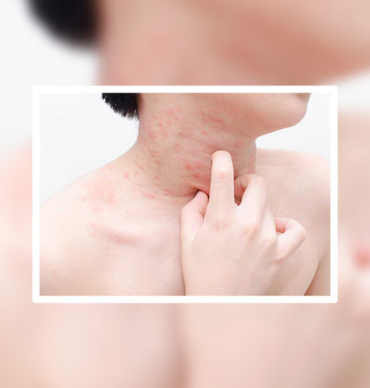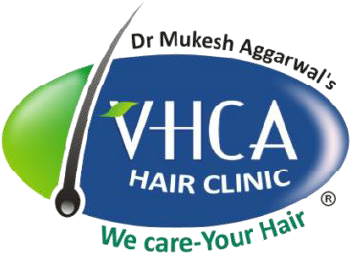Since 1928VHCA Hair Clinic World's 1st Ayurveda Hair Clinic
Eczema
Eczema, also known as atopic dermatitis, is a chronic inflammatory skin condition characterized by itchy, red, and dry patches on the skin. It often begins in childhood but can affect individuals of any age. Eczema is a complex condition influenced by genetic, environmental, and immune factors, and it can vary in severity from mild irritation to severe, debilitating symptoms. The condition tends to flare up periodically, often in response to certain triggers, and can significantly impact the quality of life.

Causes of Eczema
Genetic Factors: A family history of eczema, asthma, or hay fever increases the likelihood of developing eczema. The condition is often linked to a genetic mutation that affects the skin's ability to provide a protective barrier, leading to increased sensitivity to irritants.
Immune System Dysfunction: Eczema is associated with an overactive immune response that causes inflammation in the skin. This inflammation results in the characteristic redness, itching, and irritation seen in eczema.
Environmental Triggers:
Allergens: Common allergens such as pollen, dust mites, pet dander, and mold can trigger or worsen eczema symptoms.
Irritants: Exposure to soaps, detergents, perfumes, and certain fabrics can irritate the skin and provoke eczema flare-ups.
Climate: Cold, dry weather can dry out the skin and exacerbate eczema, while heat and humidity can increase sweating, leading to irritation.
Stress: Emotional stress can trigger or worsen eczema flare-ups by affecting the immune system and skin barrier function.
Dietary Factors: Certain foods, such as dairy products, eggs, nuts, and wheat, may trigger eczema in some individuals, particularly in children.

Symptoms of Eczema
Eczema symptoms can vary from person to person and may include:
Itchy Skin: Intense itching is a hallmark symptom of eczema. Scratching can further irritate the skin, leading to a cycle of itching and scratching.
Red, Inflamed Patches: The affected areas of skin may appear red, swollen, and inflamed. These patches are often dry, cracked, and scaly.
Dry Skin: Eczema often causes the skin to become excessively dry and rough. This dryness can lead to the formation of scales or flakes on the surface of the skin.
Thickened Skin: In chronic cases, repeated scratching can cause the skin to thicken and develop a leathery texture, a condition known as lichenification.
Oozing and Crusting: In some cases, eczema can cause the skin to ooze clear fluid or develop crusty sores, particularly if the skin becomes infected.
Blisters: Eczema may lead to the formation of small, fluid-filled blisters that can burst and become crusty.
Location of Symptoms: Eczema commonly affects the face, neck, elbows, knees, and hands, but it can occur on any part of the body.
Ayurvedic Perspective on Eczema
In Ayurveda, eczema is understood as an imbalance of the doshas, particularly Pitta and Kapha doshas. Pitta, which governs heat and metabolism, can cause inflammation and redness when aggravated, while an imbalance in Kapha can lead to the accumulation of toxins (Ama) in the body, contributing to skin disorders. Ayurveda approaches eczema by addressing these imbalances, detoxifying the body, and strengthening the skin's natural barrier.
Ayurvedic Treatment for Eczema
Herbal Remedies:
Neem (Azadirachta indica): Neem is a powerful anti-inflammatory and antibacterial herb used to soothe and cleanse the skin. It helps reduce itching, redness, and irritation.
Turmeric (Curcuma longa): Known for its anti-inflammatory and antioxidant properties, turmeric helps reduce inflammation and promotes healing.
Aloe Vera: Aloe Vera is renowned for its cooling and moisturizing effects, making it ideal for soothing dry, irritated skin.
Dietary Adjustments:
Cooling Foods: Incorporate cooling foods such as cucumbers, melons, and leafy greens to pacify the aggravated Pitta dosha.
Avoid Spicy and Sour Foods: These can aggravate Pitta and worsen eczema symptoms.
Hydration: Drink plenty of water to keep the skin hydrated and support detoxification.
Lifestyle Modifications:
Stress Management: Practice stress-reducing techniques such as meditation, yoga, and deep breathing to help manage eczema flare-ups.
Gentle Skincare: Use natural, gentle skincare products to avoid irritating the skin. Avoid hot showers and harsh soaps that can strip the skin of its natural oils.
Clothing: Wear loose, breathable clothing made of natural fibers like cotton to minimize irritation.
External Treatments:
Ayurvedic Oils: Applying oils such as coconut oil, sesame oil, or medicated Ayurvedic oils can help moisturize and protect the skin.
Ayurvedic Medicines: After a lot of research VHCA brings ayurvedic medicines to treat Eczema.
Why Choose VHCA Ayurveda Hair Clinic for Eczema Treatment?
At VHCA Ayurveda Hair Clinic, we offer a holistic approach to treating eczema that focuses on the root causes of the condition rather than just alleviating the symptoms. Our expert practitioners provide personalized treatment plans that include herbal remedies, dietary advice, lifestyle modifications, and external treatments tailored to your unique constitution and the specific nature of your eczema.
We are committed to helping you achieve lasting relief from eczema through natural, gentle, and effective Ayurvedic care. By addressing the underlying imbalances in your body and supporting the skin's natural healing processes, VHCA Ayurvedic Hair Clinic aims to restore your skin's health and improve your overall well-being.
Connect for wellness: Begin Your Journey Today
